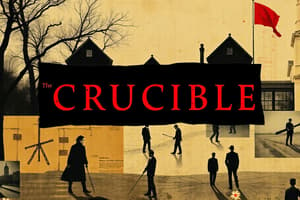Podcast
Questions and Answers
What is the irony in Abigail's statement, 'But God made my face; you cannot want to tear my face. Envy is a deadly sin, Mary'?
What is the irony in Abigail's statement, 'But God made my face; you cannot want to tear my face. Envy is a deadly sin, Mary'?
- Abigail is actually envious of Elizabeth Proctor. (correct)
- Abigail is defending her own actions.
- Abigail does not believe in God.
- Abigail wants to help Mary.
What is the main problem with Danforth's statement about pardoning?
What is the main problem with Danforth's statement about pardoning?
- He wants to pardon everyone.
- He does not understand justice.
- He believes in the court's decisions.
- It is unjust to continue hanging people. (correct)
What does Abigail mean when she says, 'I look for John Proctor that took me from my sleep and put knowledge in my heart!'?
What does Abigail mean when she says, 'I look for John Proctor that took me from my sleep and put knowledge in my heart!'?
Abigail is revealing her past affair with John Proctor.
What does the statement mean: 'A person is either with this court or he must be counted against it'?
What does the statement mean: 'A person is either with this court or he must be counted against it'?
Why is Abigail concerned about her name?
Why is Abigail concerned about her name?
What does John Proctor mean by saying, 'Because it is my name! Because I cannot have another in my life!'?
What does John Proctor mean by saying, 'Because it is my name! Because I cannot have another in my life!'?
What does Danforth imply by stating, 'We burn a hot fire here; it melts down all concealment'?
What does Danforth imply by stating, 'We burn a hot fire here; it melts down all concealment'?
What is Tituba's status during the witch trials?
What is Tituba's status during the witch trials?
What is significant about Proctor's admission of lust and its consequences?
What is significant about Proctor's admission of lust and its consequences?
Flashcards are hidden until you start studying
Study Notes
Key Quotes in The Crucible
- Abigail's claim that "God made my face" illustrates her deep-seated envy of Elizabeth Proctor, despite her insistence on innocence and virtue.
- Danforth's remark about justice reveals the ironic absurdity of continuing executions simply because others have already been carried out, questioning the morality of the court's actions.
- Abigail's confession of her past relationship with John Proctor showcases her obsession and inability to move on, further fueled by her desire to remove Elizabeth and reclaim Proctor's affection.
- The statement emphasizing allegiance to the court indicates that dissent is seen as treachery, revealing the oppressive nature of the theocratic system in Salem.
- Abigail's frantic defense of her reputation highlights the societal pressures women faced in Salem; her fear of being labeled immoral prompts her to wrongfully accuse others to protect herself.
- Proctor's struggle with his identity underscores the importance of reputation in Salem, as he grapples with the implications of his guilt and the repercussions of standing against the court.
- Danforth’s metaphor of a crucible serves as a powerful symbol for the trials, which expose not only the lies of the individuals but also their true natures, revealing hidden motives and hypocrisy.
- Hale's declaration positions Tituba as an important figure in the trials, momentarily elevating her from her marginalized status, thus reflecting the twisted power dynamics instigated by the witch hunts.
- Proctor's admission of lust and his subsequent moral conflict illustrate a pivotal moment where he prioritizes justice over personal integrity, highlighting the tragic consequences of his honesty in a corrupt system.
Studying That Suits You
Use AI to generate personalized quizzes and flashcards to suit your learning preferences.




